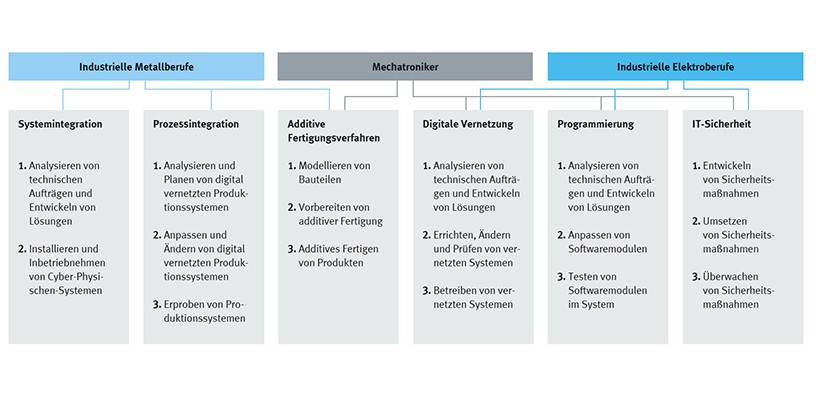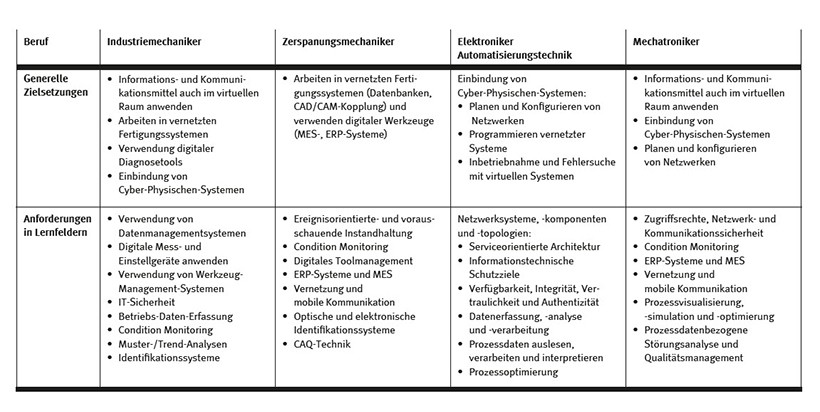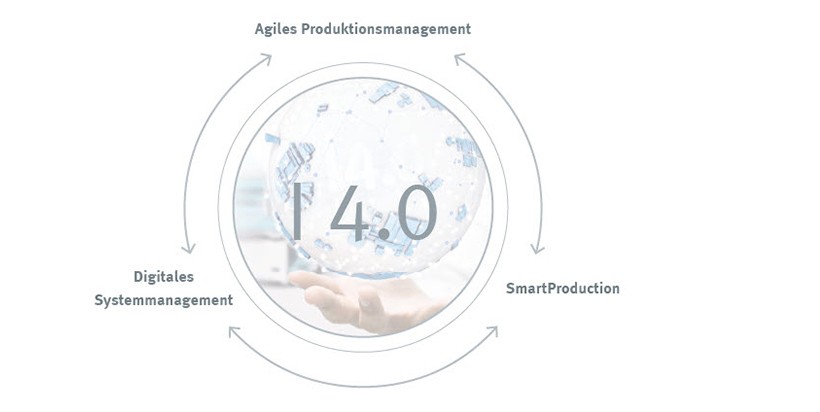The M + E occupations were revised in 2018 and the core qualifications digitalization of work, data protection and information security were newly added with the occupational profile item 5. On paper, it is clearly defined which additional learning content must be taught in the company, school and further training. But do you already have a consistent plan for implementation?
Again and again, our customers ask: Can the equipment already in place be expanded to accommodate the new learning content? What qualification content can be taught in theory, where do practical exercises have to be done? At which points in the curriculum or training framework do the new contents fit best?
The working environment of metalworking and electrical occupations is changing. Intelligent production systems are part of everyday working life and require additional knowledge and skills from skilled workers in the M+E sector. Digitalization has become an integral part of production and maintenance.
The learning path Digitization in Pneumatics takes up the most important learning content for the fundamentals of digitization in a subject-systematic concept. The starting point is the control technology training that is anchored in the framework curriculum.Simple extensions to your existing teaching and learning materials for electropneumatics enable the training of all important learning content for digitization. In this way, you ensure that your training is sustainable. Your learners can operate in the environment of intelligent systems with the content of the learning path and use it effectively.
The learning path is an orientation guide that can be customized.Trainers and learners know in advance the learning objective and the steps required to achieve this learning objective.
Are your laboratories ready for digitization?
Teaching the technical basics is one thing, but in this context it is also worth checking the spatial conditions with a view to the new requirements: Are there sufficient areas and storage facilities for the equipment? Will frontal teaching still be a central form of learning in the future? How can we implement group work, self-learning phases and practical exercises in addition to theory in our current rooms?
Our matching brochures
Partial amendment - here you will find the main innovations on the topics of digitization and networking:
Qualification content that is fundamentally necessary in dealing with digital work in vocational trainers was included in the common core qualifications of the aforementioned training regulations as the new vocational training item 5 "Digitization of work, data protection and information security". Their content is to be taught integratively throughout the entire training period.
Operations

- Create order-related and technical documents with standard software
- Maintain, exchange, save and archive data and documents
- Enter, process, transmit, receive and analyze data
- Apply data protection regulations
- Use information technology systems (IT systems) for order planning, order processing and deadline tracking
- Research information sources and obtain information from digital networks and evaluate information
- Use digital learning media
- Consider the information technology protection goals of availability, integrity, confidentiality and authenticity
- Comply with company guidelines on mobile data carriers, electronic mail, IT systems and Internet sites.
- Recognize anomalies and irregularities in IT systems and take measures to eliminate them
- Use assistance, simulation, diagnostic or visualization systems
- Plan, communicate and collaborate in interdisciplinary teams
Furthermore, the ordinances have been updated individually with regard to I 4.0-relevant core and specialist qualifications, in particular the occupational profile items "operational and technical communication" and "planning and organizing work, evaluating work results".In addition to the training framework plan, the cross-occupational additional qualifications have been included in the ordinances as an additional option for qualification in central fields of activity that can be realized in the short term.
Vocational schools

The Standing Conference of the Ministers of Education and Cultural Affairs of the Länder in the Federal Republic of Germany has adopted binding amendments to the framework curricula. The general objectives as well as the individual learning fields were supplemented.The table below shows selected examples of the valid framework curricula for new requirements in the digital context.
Further education

The digital transformation also requires an adaptation of technician qualifications with a focus on Industry 4.0. This is currently being developed and the following interconnected fields of action are already emerging:
Glossary Industry 4.0
Give your learners the opportunity to familiarize themselves with the many new terms and abbreviations already during the basics of digitalization